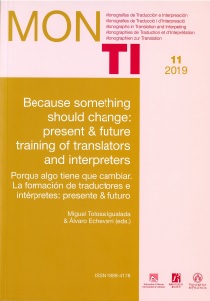Teaching Translation through Gender Topics: Adapting the Instructional Design of an Introductory Translation Course
Main Article Content
Abstract
Downloads
Article Details
The documents contained in these directories are included by the contributing authors as a means to ensure timely dissemination of scholarly and technical work on a non-commercial basis. It is understood that all persons copying this information will adhere to the terms and constraints invoked by each author's copyright. These works may not be reposted without the explicit permission of the copyright holder.
References
Cerda Gutiérrez, Hugo. (2007) La investigación formativa en el aula. La pedagogía como investigación. Bogotá: Cooperativa Editorial Magisterio.
Corrius, Montse; Marcella De Marco & Eva Espasa. (2016) “Situated learning and situated knowledge: gender, translating audiovisual adverts and professional responsibility.” The Interpreter and Translator Trainer 10:1, pp. 59-75
Ergun, Emek & Olga Castro. (2017) “Pedagogies of Feminist Translation.
Rethinking Difference and Commonality across Borders.” En: Ergun, Emek & Olga Castro (eds.) 2017. Feminist Translation Studies. Local and Transnational Perspectives. Londres & Nueva York: Routledge, pp. 93-107
García Izquierdo, Isabel & Esther Monzó Nebot. (2003) “Una enciclopedia para traductores. Los géneros de especialidad como herramienta privilegiada del traductor profesional.” En: Muñoz Martín, Ricardo (ed.) 2003. I AIETI. Actas del I Congreso Internacional de la Asociación Ibérica de Estudios de Traducción. Granada: Asociación Ibérica de Estudios de Traducción e Interpretación, pp. 83-97
García López, Rosario. (2004) Guía didáctica de la traducción de textos idiolectales. Coruña: Netbiblo
González-Davies, María & Vanessa Enríquez-Raído. (2016) “The Interpreter and Translator Trainer Situated learning in translator and interpreter training: bridging research and good practice.” The Interpreter and Translator Trainer 10:1, pp. 1-11
Hernández, Carlos Augusto. (2003) “Investigación e investigación formativa.” Nómadas 18, pp. 183-193. Versión electrónica: http://www.redalyc.org/pdf/1051/105117890018.pdf
Kiraly, Don. (2014) A Social Constructivist Approach to Translator Education. Empowerment from Theory to Practice. Londres & Nueva York: Routledge
MINEDU. (2017) Currículo nacional de la educación básica. Lima: Ministerio de Educación del Perú. Versión electrónica: http://www.minedu.gob.pe/curriculo/pdf/curriculo-nacional-de-la-educacion-basica.pdf
Ministerio de la Mujer y Poblaciones Vulnerables. (2018) Resumen estadístico de feminicidio y tentativas. Versión electrónica: https://www.mimp.gob.pe/contigo/contenidos/pncontigo-articulos.php?codigo=39
Nord, Christiane. (2009) “El funcionalismo en la enseñanza de traducción.” Mutatis Mutandis: Revista Latinoamericana de Traducción 2:2, pp. 209-243
ONU Mujeres. (2017) Dónde estamos: Perú. Versión electrónica: http://lac.unwomen.org/es/donde-estamos/peru
Parra, Ciro. (2004) “Apuntes sobre la investigación formativa.” Educación y Educadores 7, pp. 57-77. Versión electrónica:
http://educacionyeducadores.unisabana.edu.co/index.php/eye/article/view/549/642
Popkewitz, Thomas. (1988) Paradigma e ideología en investigación educativa. Madrid: Mondadori
Restrepo, Bernardo. (2006) “Conceptos y aplicaciones de la investigación formativa, y criterios para evaluar la investigación científica en sentido estricto.” Versión electrónica: http://www.cna.gov.co/1741/articles-186502_doc_academico5.pdf
Susam-Sarajeva, Şebnem. (2014) “A course on «Gender and Translation» as an Indicator of Certain Gaps in the Research on the Topic.” En: Santaemilia, José. (ed.) 2014. Gender, Sex and Translation. The Manipulation of Identities. Londres & Nueva York: Routledge, pp. 161-176


